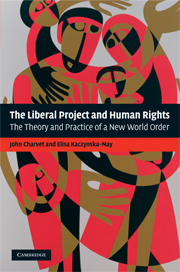Book contents
- Frontmatter
- Contents
- List of abbreviations
- Preface
- Introduction: what is liberalism?
- Part I Liberal beginnings
- Part II The UN regime on human rights
- 4 The UN and regional declarations and covenants on human rights
- 5 The right of peoples to self-determination
- 6 The right to development and development assistance
- 7 Women's international human rights
- 8 The implementation of international human rights
- Part III Critique and defence of liberalism
- Notes
- Index
6 - The right to development and development assistance
Published online by Cambridge University Press: 04 June 2010
- Frontmatter
- Contents
- List of abbreviations
- Preface
- Introduction: what is liberalism?
- Part I Liberal beginnings
- Part II The UN regime on human rights
- 4 The UN and regional declarations and covenants on human rights
- 5 The right of peoples to self-determination
- 6 The right to development and development assistance
- 7 Women's international human rights
- 8 The implementation of international human rights
- Part III Critique and defence of liberalism
- Notes
- Index
Summary
The objective of development is to create an enabling environment for people to enjoy long, healthy and creative lives.
Mahbub ul HaqThe denial of human rights is inherent in poverty, something which is powerfully recorded in recent studies, such as Voices of the Poor.
Deepa NarayanRight to development (RTD)
Declaration on RTD
The 1986 Declaration on RTD was adopted by a vote of 146 to 1 (the US), with 8 abstentions (including Germany, Japan and the UK).
The preamble of the Declaration calls in support the UN Charter provisions. These are contained in:
Article 55, which states that the UN shall promote (a) high standards of living, full employment and conditions of economic and social progress and development; (b) solutions of international economic, social, health and related problems; and international cultural and economic co-operation; and
Article 56, which says that all members pledge themselves to take joint and separate action in co-operation with the organization for the achievement of the purposes set forth in Article 55.
The preamble also recognizes that development is a ‘comprehensive economic, social, cultural and political process’, and it calls for efforts at the international level to promote and protect human rights to be accompanied by efforts to establish a new international economic order (we discuss in detail below what this means).
Article 1 of the Declaration defines the right to development as:
an inalienable human right by virtue of which every human person and all peoples are entitled to participate in, contribute to and enjoy economic, social, cultural and political development in which all human rights and fundamental freedoms can be fully enjoyed.
- Type
- Chapter
- Information
- The Liberal Project and Human RightsThe Theory and Practice of a New World Order, pp. 136 - 199Publisher: Cambridge University PressPrint publication year: 2008



